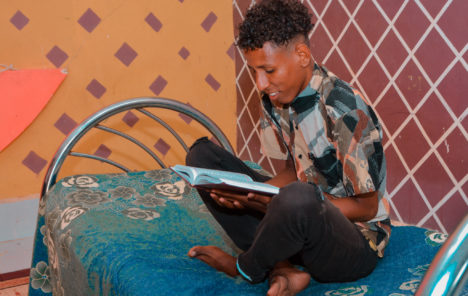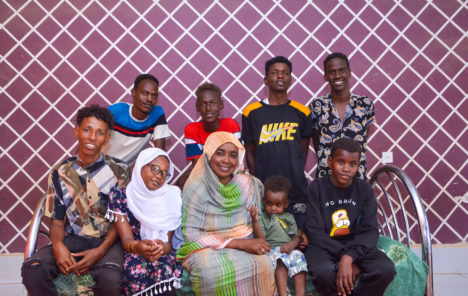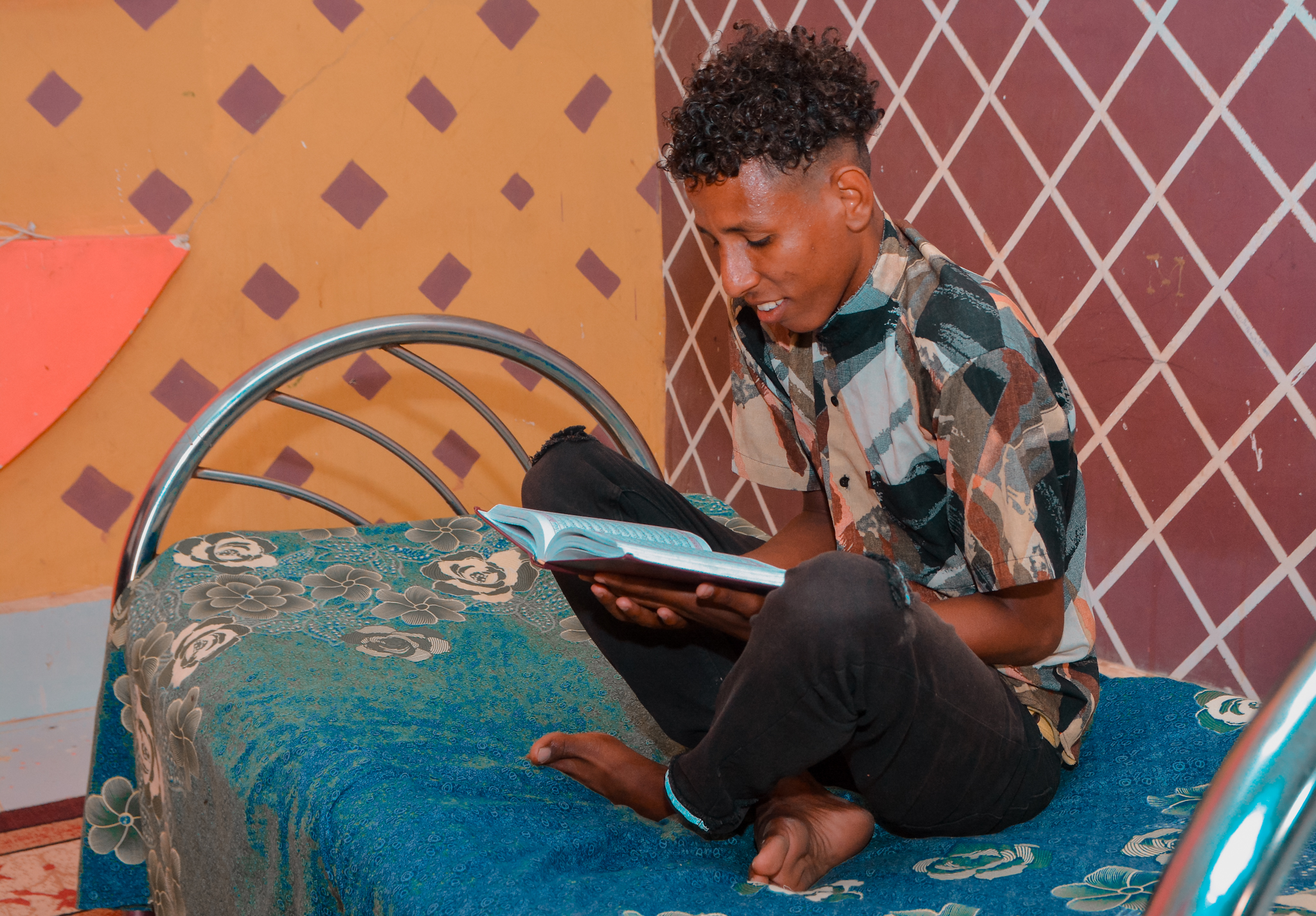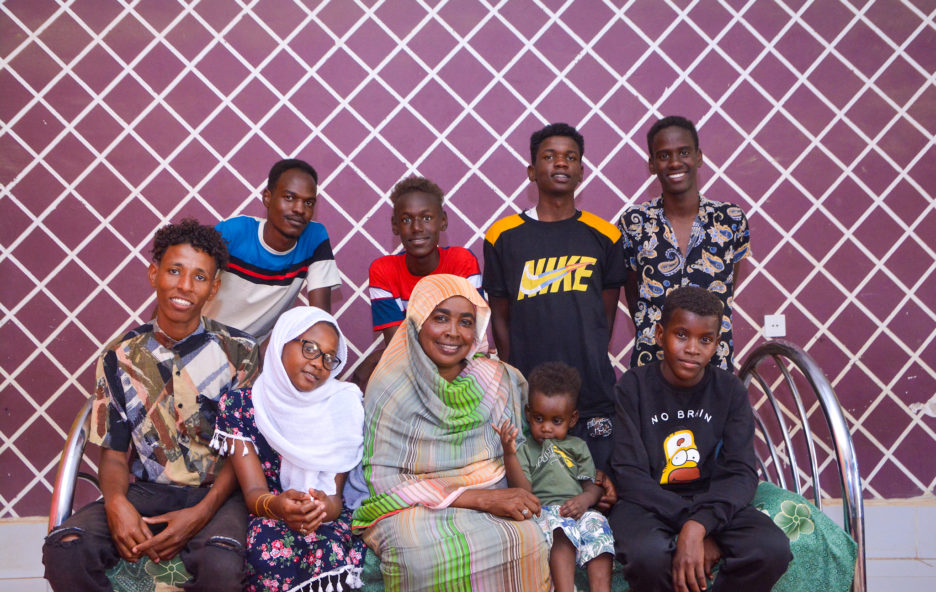“I last went to school on Thursday 13 April 2023. It was also the last time I saw my friends. The memories of that day have stayed with me. I long for the day peace returns so we can meet again and complete school together.”
These are the words of 14-year-old Malik from Sudan.
Malik hasn’t been to school in almost a year, since the fighting between the Sudanese Armed Forces (SAF) and paramilitary Rapid Support Forces (RSF) began in Khartoum on 14 April 2023, interrupting his life and uprooting him from his home.
Malik lived in the SOS Children’s Village in Khartoum. The Village was overrun by armed troops when the war began forcing the 15 families living there to quickly evacuate.
Like many families affected by this conflict, they lost everything they had.
“I never imagined I would wake up one day and not be in the place I’ve lived my whole life. Not see my friends or go to school. It breaks my heart that my world has been turned upside-down."
“I have lost my home and life as I knew it.”
The war, which had been centred in Khartoum, has escalated and spread to areas previously considered secure, forcing people to flee repeatedly.
The families who lived at the SOS Children’s Village have moved twice now.
An estimated 9 million people have been displaced, while 13,000 have lost their lives. Many more have been injured.
A growing crisis
The intense fighting has left Khartoum, once a bustling city, in ruins and has triggered ethnic violence in the western region of Darfur.
Half of Sudan’s population – around 25 million people including 14 million children – are in dire need of humanitarian assistance and protection according to the United Nations.
And with 4 million children displaced, Sudan is facing the largest child displacement crisis in the world. Some of these children are separated from family members and have to fend for themselves to survive.
Figures from UNICEF (2019) show that many children in Sudan have lost parental care due to previous conflicts, displacement, and poverty – 18% are no longer living in a family environment.
Families that were already living in difficulty will find it much harder to cope in the current conflict. With their source of income lost, these families are more fragile leaving them unable to care for their children or guarantee protection from abuse, neglect, or exploitation. There are reports that armed groups target these children in particular.
Malik and his five siblings, 12, 13, 15, 17 and 21, feel fortunate to be safe and in the care of an SOS Children’s Villages caregiver, who they can look to for safety and reassurance when they’re scared.
“I am in a safe environment right now,” Malik says, “but it makes me sad that many children my age are suffering daily, and some are all alone.
“My caregiver has helped us cope in every way possible, especially when we felt completely lost and terrified.
“No matter the situation, she always reassures us that so long as we stay together, we’ll be safe. She has a way of distracting us from our worries, which makes us feel comfortable to open up and talk about our darkest thoughts.”
Education system erodes
With the conflict continuing, Malik is among an estimated 20 million children who can no longer go to school, plunging the future of an entire generation into uncertainty.
The UN says Sudan is on the verge of facing the worst education crisis globally.
“Before the war, I thought my life was boring,” Malik says, “attending school all week and hanging out with school friends on weekends, playing football.
“I now miss my old quiet life. If only I could have it back for just one day. The war has forced us to sacrifice our education and our passions. We feel left behind by the rest of the world.”
Finding a safe neighbourhood
Making friends in the neighbourhood where Malik’s family found safety has brought a bit of “ordinary” back to his life again. For lack of anything else to do, his days have boiled down to playing football on the streets.
To add more “flavour to his life,” Malik says he reads a fictional book after breakfast every day. He likes that the words and stories transport him to another realm “free of guns, hunger and death.”
“I bought this Harry Potter from the last open-air book fair I attended with my friends from school in January last year (2023) in Khartoum. Here I discovered a small bookshop in a quiet street corner.”
Malik visits the store regularly to look for his next read.
“I miss Khartoum,” he adds. “There is a bookstore on almost every street. It is easy to find a good book in the city – but here not so much.”
Asked about his future, Malik says it’s difficult to talk about the future with no sign of a ceasefire.


“I’m not sure anymore if I should continue dreaming of becoming a doctor, and this for me is extremely sad and confusing. With the war going on, how do I complete school and go to university? What will happen to my dreams?"
“There is a part of me that worries the war will never end.
“My family and I are trying to be strong for each other, but we are weary and just want the fighting to stop. We want to go back home and live in peace.”
How SOS Children’s Villages is helping in Sudan
SOS Children’s Villages has been working in Sudan for over 40 years and in December 2023 scaled up support with the introduction of an Emergency Programme.
So far, the Programme has supported over 10,000 children and adults, providing food, cash, hygiene kits and psychosocial support.
It is a lifeline for children and families affected by the war and will be continued for another two years.
*Names changed for privacy reasons.
Read more:
Q&A with Abdelrahman, National Director of SOS Children’s Villages in Sudan


